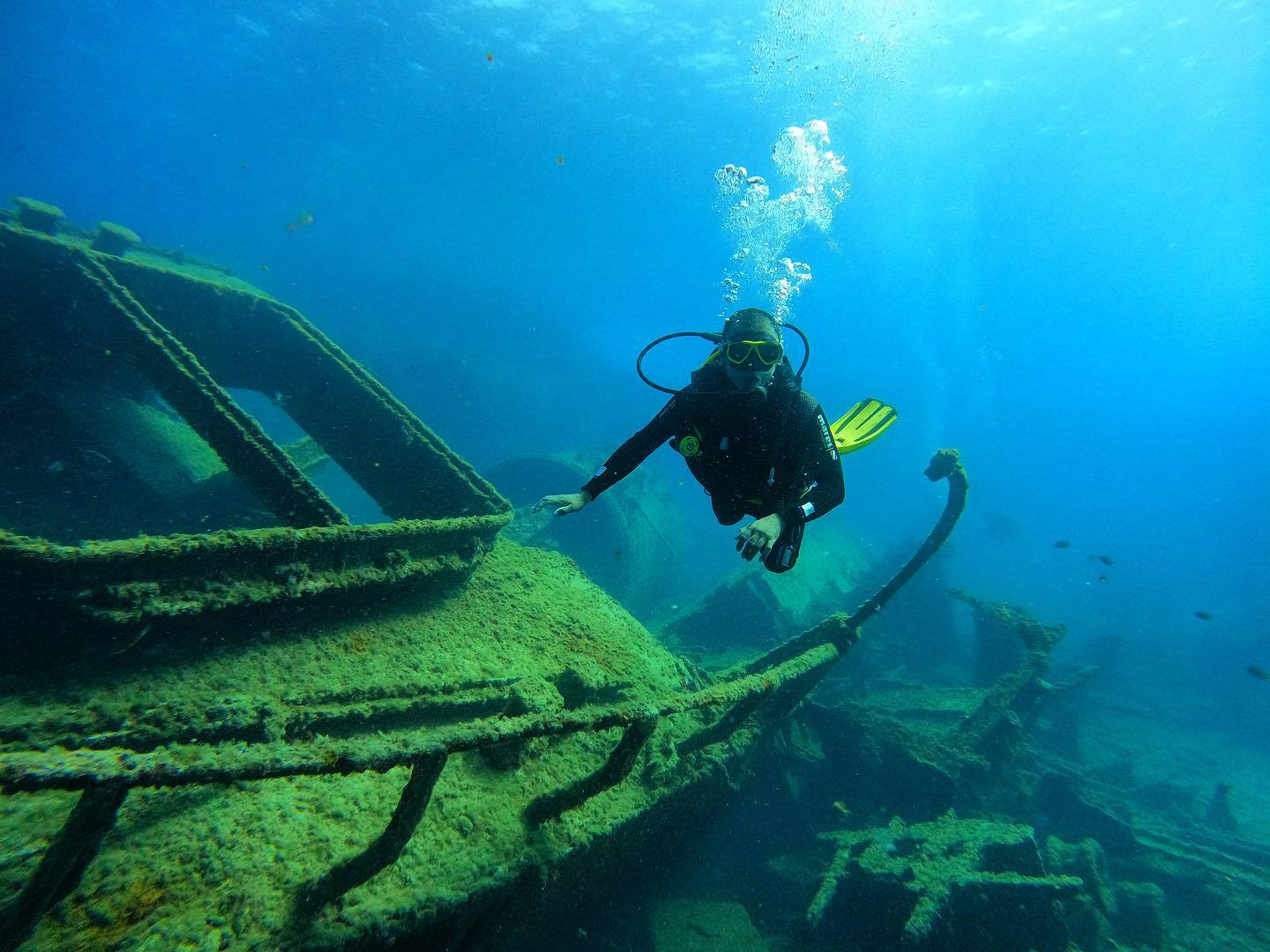
Can I dive? FAQ
Thinking about diving? Check if you're fit, explore the benefits of scuba diving, and embark on an unforgettable underwater adventure with our expert tips!
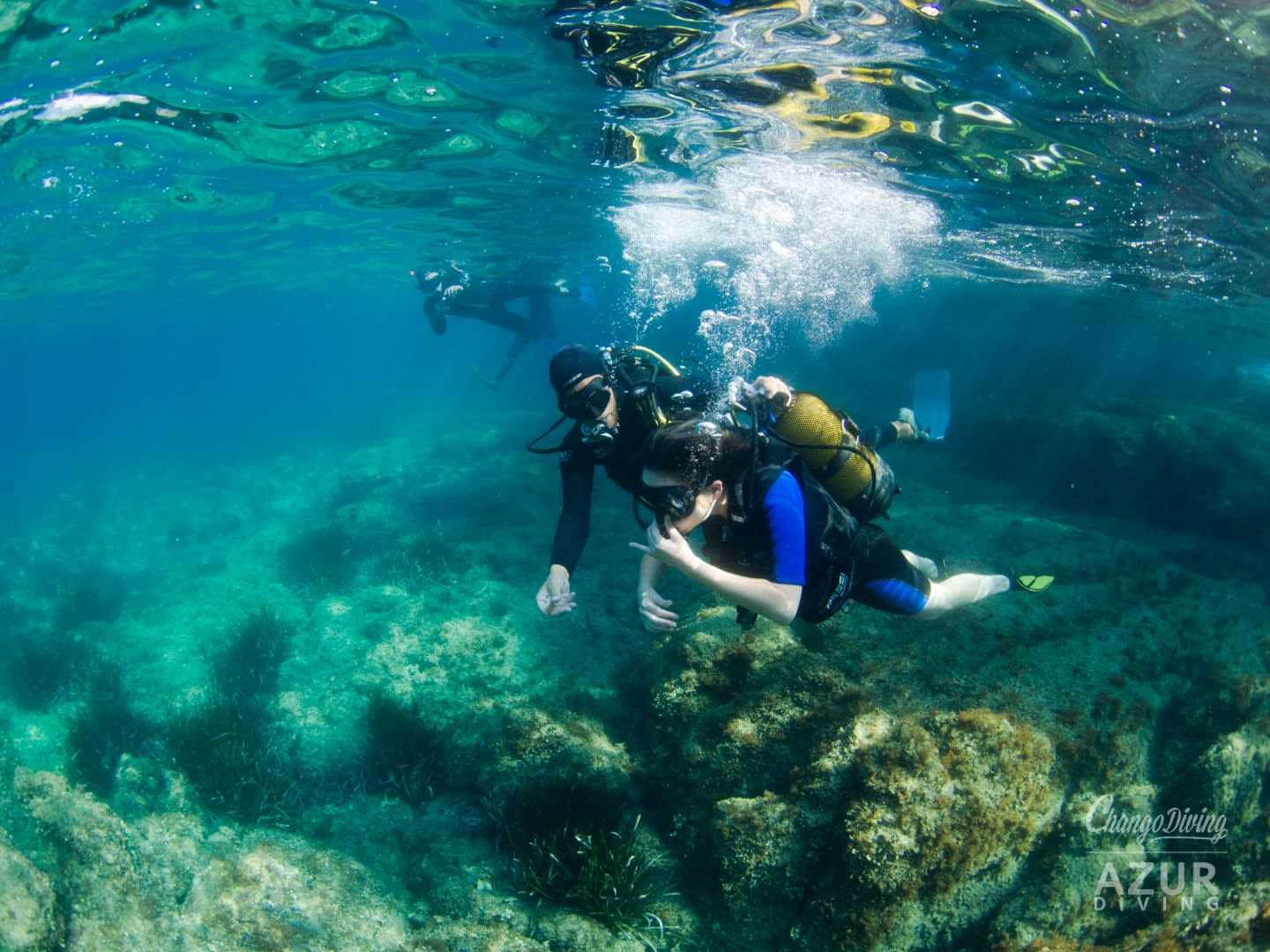
Welcome to Manawa, the website for booking outdoor activities around the world. From diving to canyoning, we connect adventure enthusiasts with professional local instructors to guarantee unforgettable experiences.
Scuba diving is a popular recreational activity that allows people to explore the underwater world. It involves the use of specialized equipment, including a diving mask, fins, and a breathing apparatus, to breathe underwater. Divers can explore shipwrecks, coral reefs, and other underwater environments, and may also engage in activities such as photography and fish watching. Scuba diving can be a thrilling and educational experience, but it is important to have proper training and equipment to ensure safety.
This article answers frequently asked questions about scuba diving in order to help you to get ready for your first diving experience.
Scuba diving is a type of underwater diving that involves the use of self-contained underwater breathing apparatus (SCUBA), which allows the diver to breathe underwater for extended periods of time. Scuba diving allows the diver to explore the underwater world in greater depth and for longer periods of time than is possible with snorkeling or free diving.
This activity requires specialized training and equipment, and it is generally considered to be a more advanced form of diving than snorkeling. It is particularly popular among recreational divers, as well as professional divers who use it for scientific research, underwater photography, and other purposes.
The origin of scuba diving can be traced back to the early 1900s, when the first self-contained underwater breathing apparatus, or scuba, was invented. The first scuba diving equipment was developed by the French Navy in the late 1800s, but it wasn't until the 1930s and 1940s that the technology was refined and made more widely available for use by recreational divers. Today, scuba diving is a popular recreational activity enjoyed by millions of people around the world.
There are several different types of scuba diving, including recreational diving, technical diving, cave diving, wreck diving, and more.
There are many other types of scuba diving, each with its own unique characteristics and challenges.
There are many reasons why people enjoy scuba diving. For some, it is the thrill of exploring the underwater world and seeing a variety of marine life. For others, it is the sense of adventure and challenge that comes with diving in the open water. Still, others enjoy the peacefulness and serenity of being underwater. Overall, scuba diving can be a fun and exciting way to explore the underwater world and experience the beauty of the ocean.
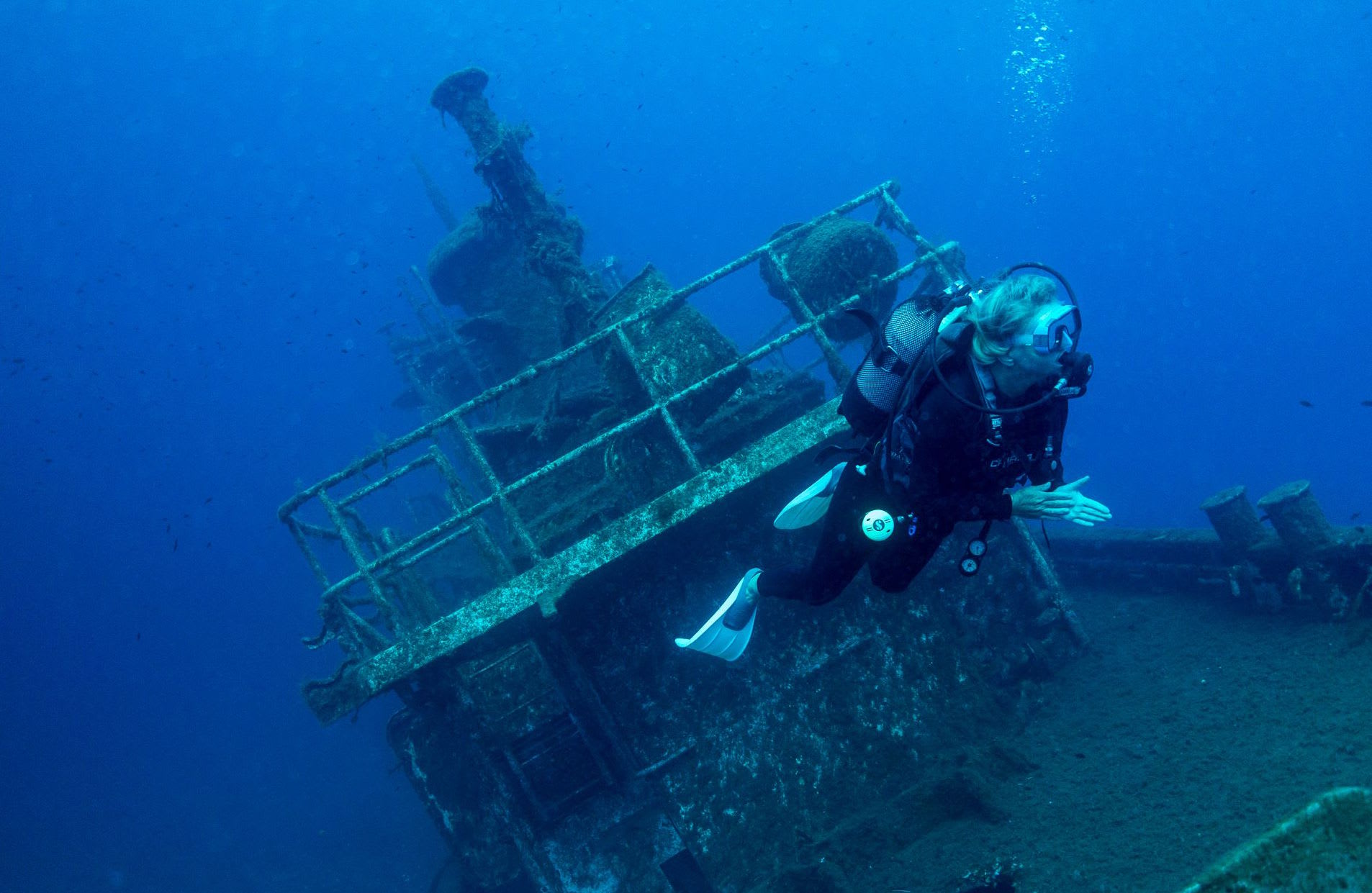
If you are interested in learning how to scuba dive, the first step is to find a reputable scuba diving school or instructor. A certified scuba diving instructor will be able to teach you the skills and knowledge you need to safely scuba dive.
Most scuba diving schools offer introductory courses or discover scuba diving experiences that allow you to try scuba diving in a controlled environment without committing to a full certification course. These introductory courses will typically include a brief lesson on the basic principles of scuba diving, followed by a supervised dive in a pool or shallow water.
Once you have completed an introductory course, you can sign up for a full certification course, which will teach you the skills and knowledge you need to become a certified scuba diver. Certified scuba divers are able to dive independently with a buddy, within the limits of their training and experience.
During a scuba dive, you will typically spend your time exploring the underwater environment and observing marine life. This can include swimming through schools of colorful fish, spotting larger creatures such as sharks or rays, and investigating interesting features such as shipwrecks or coral reefs.
Depending on the location and type of dive, you may also have the opportunity to collect scientific data or take part in conservation efforts. Overall, the activities you engage in during a scuba dive will depend on your individual interests and the specific dive site.
The best time to do scuba diving can vary depending on a number of factors, including the location, the type of diving you want to do, and the weather and ocean conditions.
In general, the best time to scuba dive is when the weather is calm and the water visibility is good. This is typically in the summer months when the water is warm and the weather is stable. However, the best time to dive also depends on the location and the type of diving you want to do. For example, if you want to see a particular type of marine life, you may want to go diving during the time of year when that species is most active.
It's also important to consider the tides and currents when planning a dive, as these can affect the diving conditions and the visibility underwater.
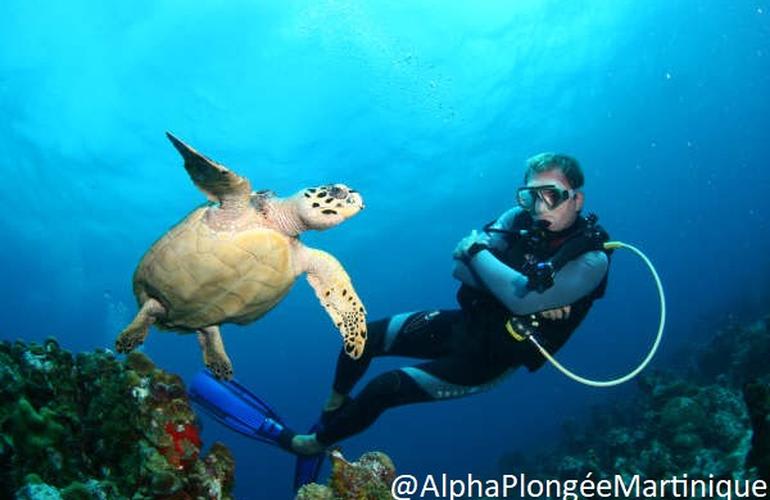
The equipment used for scuba diving typically includes the following:
The dive mask allows you to see clearly underwater, while the snorkel and fins help you move efficiently through the water. The regulator is a critical piece of equipment that provides you with air from the dive tank, and the BCD helps you control your buoyancy. The dive computer is used to monitor your depth and time underwater, and the wetsuit or drysuit keeps you warm in the colder water. Weights are used to help you sink to the desired depth. Other specialized equipment may also be used depending on the type of dive and the conditions at the dive site.
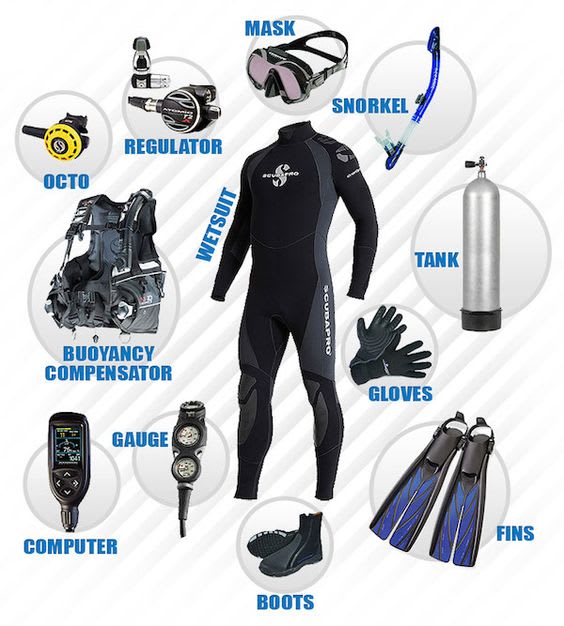
Scuba diving is open to anyone who is in good physical health and is comfortable in the water. There is no age limit for scuba diving, but children under the age of 10 or 12 may not have the physical ability or maturity to participate in scuba diving.
Most scuba diving schools and dive operators have minimum age requirements for their courses and dives. It's important to check with the specific dive operator or dive school you are considering to find out their age requirements and any other restrictions they may have. In general, scuba diving is a safe and enjoyable activity that can be enjoyed by people of all ages, as long as they are physically able and properly trained.
There are several different certifications in scuba diving, each with its own set of skills and knowledge that must be demonstrated to earn the certification.
The basic levels of scuba diving are:
After completing these levels, divers can choose to pursue specialized certifications in areas such as wreck diving, cave diving, and more. The levels of scuba diving are designed to help divers develop the skills and knowledge they need to dive safely and enjoy the underwater world.
PADI (Professional Association of Diving Instructors) and SSI (Scuba Schools International) are both organizations that offer training and certification for scuba divers. Both organizations offer a range of courses for divers of all levels, from beginner to advanced. However, there are a few key differences between the two organizations.
One difference is the structure of their training programs. PADI courses tend to be more flexible, allowing divers to progress at their own pace and choose the specific skills they want to learn. In contrast, SSI courses are more structured, with a set curriculum that must be followed in order.
Another difference is the availability of training materials. PADI has a wider range of training materials available, including e-learning options and a variety of multimedia materials. SSI also offers training materials, but their selection is not as extensive as PADI's.
Overall, both PADI and SSI are reputable organizations that offer high-quality scuba diving training. The best choice for you will depend on your individual needs and preferences.
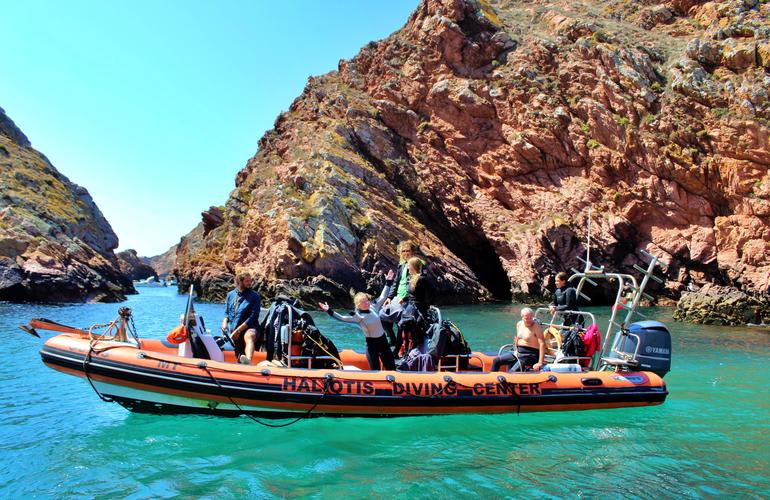
No, you cannot scuba dive without certification. Scuba diving is a potentially dangerous activity, and proper training is necessary to ensure the safety of the diver and those around them. In order to scuba dive, you must complete a training course and obtain a certification from a recognized organization, such as PADI or NAUI. This certification is proof that you have received the necessary training and are qualified to scuba dive.
The only exception is the Discovery scuba dive during which you will be accompanied by a certified diver, in a controlled environment and without committing to a full certification course.
A discovery dive, also known as a resort dive or intro dive, is a type of introductory scuba diving experience that allows people who are not certified scuba divers to try out scuba diving in a safe and controlled environment. This type of dive is typically only offered at dive resorts and is designed for people who are interested in scuba diving but are not yet ready to commit to a full certification course.
In order to participate in a discovery dive, you typically do not need to have any prior scuba diving experience or certification. However, you will still be required to complete a brief training session and demonstrate that you are able to safely operate the scuba diving equipment and follow the instructions of the dive guide. As with any type of scuba diving, it is important to listen to the instructions of the dive guide and follow their lead, as they are trained to ensure the safety of all divers.
A discovery dive, also known as a resort dive or intro dive, is a type of introductory scuba diving experience that allows people who are not certified scuba divers to try out scuba diving in a safe and controlled environment. This type of dive is typically only offered at dive resorts and is designed for people who are interested in scuba diving but are not yet ready to commit to a full certification course.
During a discovery dive, you will be given a brief training session by a certified dive instructor, who will teach you the basic skills and safety procedures needed to scuba dive. This will typically include instruction on how to use the scuba diving equipment, how to communicate with other divers and the dive guide, and how to safely descend and ascend from the dive site.
Once you have completed the training session, you will typically go on a guided dive with a dive instructor or dive guide. The dive will be in shallow water, usually no deeper than 40 feet, and will last for about 30-45 minutes. The dive guide will lead you on a tour of the dive site, pointing out interesting marine life and other underwater features.
Discovery dives are a great way to get a taste of scuba diving and see if it is something you might be interested in pursuing further. However, it is important to note that a discovery dive does not provide the full training and certification needed to scuba dive independently. If you want to continue scuba diving after your discovery dive, you will need to complete a full certification course.
There are many great spots to try scuba diving around the world. Some of the best scuba diving destinations include the Great Barrier Reef in Australia, the Maldives, the Red Sea in Egypt, the Galapagos Islands and the Caribbean Sea. These destinations are known for their beautiful coral reefs, clear waters, and diverse marine life.
Other popular scuba diving destinations include the Mediterranean Sea, the Philippines, the Bahamas, Bonaire, and Thailand. Many of these destinations offer a wide range of dive sites, from shallow coral reefs to deep wrecks and caves, so there is something for every level of diver to enjoy. Another unique spot is the Silfra Rift in Iceland, where you're diving between two continental plates. Discover all our scuba diving spots.
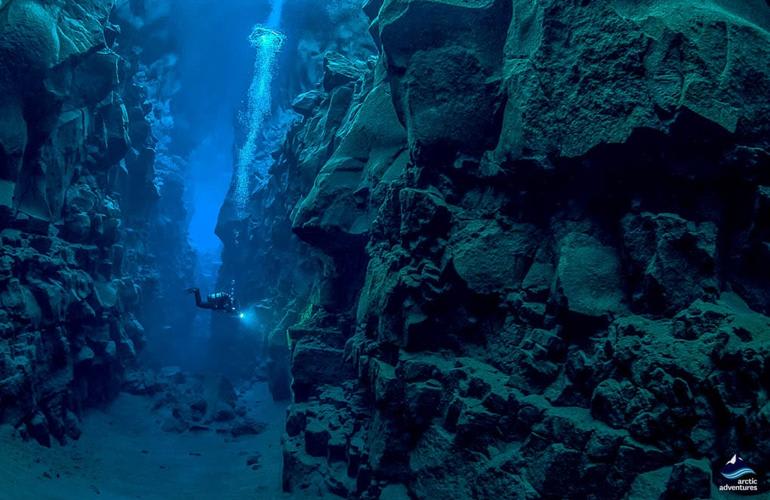
Before you start scuba diving, it is important to ensure that you are in good physical health and do not have any medical conditions that could be exacerbated by diving. This typically involves undergoing a medical examination by a doctor who is certified to evaluate divers. During the examination, the doctor will ask about your medical history and check for any conditions that could affect your ability to dive safely.
Some medical conditions that may prevent you from diving include certain heart and lung conditions, epilepsy, and diabetes. It is also important to inform the doctor of any medications you are taking, as some medications can affect your ability to dive safely.
Overall, it is essential to consult with a qualified doctor before starting scuba diving to ensure that it is safe for you.
Scuba diving carries some inherent risks, such as the possibility of equipment failure or running out of air. There is also a risk of decompression sickness, which can occur if a diver ascends to the surface too quickly.
Additionally, diving at great depths can be dangerous due to the increased pressure and the need for specialized equipment and training.
However, these risks can be greatly reduced by following proper safety procedures, using reliable equipment, and receiving proper training from a certified instructor. Overall, with the right preparation and care, scuba diving can be a safe and very enjoyable activity. Have a look at all our scuba diving activities with certified guides.

Driven by a genuine passion for adventure, I love sharing my discoveries and passing on my tips with simplicity and enthusiasm. My goal: to inspire you, guide you, and spark your desire to experience your own unforgettable outdoor moments.